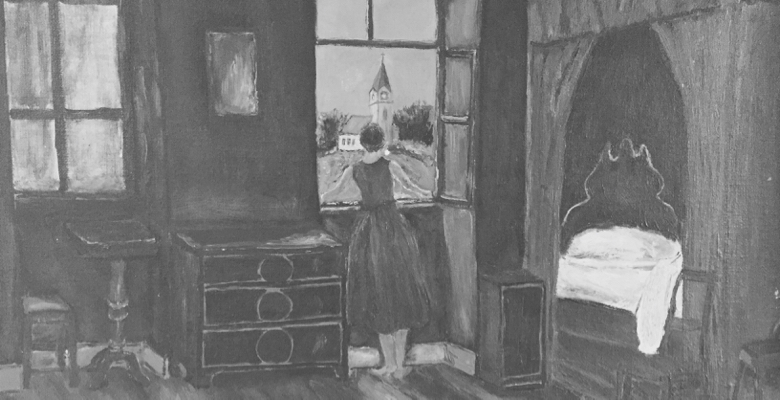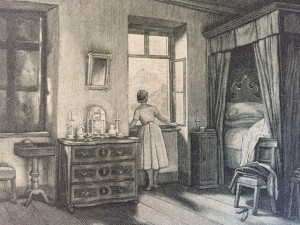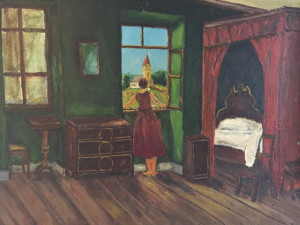You Need to Create: Why Making Art Is for Everyone

There’s a beautiful painting in my parents’ basement.
It was painted by my great-grandfather Hans Spillner, and it depicts a woman looking out a window at a church on a hill.
[caption id=“attachment_213” align=“alignright” width=“300”] The sketch[/caption]
The sketch[/caption]
[caption id=“attachment_212” align=“alignright” width=“300”] The painting[/caption]
The painting[/caption]
The painting is neither technically masterful nor original (it’s based on a sketch from a children’s reader). It’s the work of an amateur.
But it was done by someone who painted for fun. An adult with a full-time job, who, after work or on the weekends, set up an easel and got out his paints instead of staring at the television.
An amateur.
Question: How many amateur painters, or writers, or musicians do you know?
I don’t know very many.
We have a problem, and it’s the idea that creating art is only for kids and professionals.
We need to do something about this, and I hope you’ll join me. Let me sell you on the importance of creating.
What’s the point of art?
To touch people?
Yes. At its core, art is a gift from the artist to the audience, whether or not money changed hands in the process of getting the performer on the stage and the audience in the seats.
To create change in ourselves?
Also yes. I pick up my trumpet every morning because I like the way making music makes me feel. I perform to give a gift to others (and I need to practice in order to perform effectively), but on a daily basis, I play for me. On days when I don’t play, I feel a little off. My wife notices. I don’t feel like a complete human being.
Isn’t excellence the point? Practice makes perfect, right?
We have come to believe that excellence is the point. Mastery. Perfection, even.
It’s not. Not the main point, anyway.
Human expression, our ability to do something that creates change in others and in ourselves: that’s the point.
You do not need to be a master of your medium to touch people.
But here’s the nice thing: if you make art often enough, excellence sneaks in the back door.
Kids get a pass
Every child is an artist. The problem is how to remain an artist once he grows up. — Pablo Picasso
As a society, we encourage creativity in kids. Finger-paint in kindergarten. Write a short story in middle school. Make music in high school band, but only because it teaches skills like problem solving, perseverance and goal-setting. Not because music has any intrinsic value. Not because your performance at the winter concert might make your grandma cry, or might help you forge an emotional connection to other human beings.
Professionals get a pass
“I’m a sculptor.” “I’m a jazz musician.” “I’m a poet.”
When we find out someone’s a creative professional, our attention is piqued. “Wow!” we think. “This person must be really talented.”
Not only do we give the professional a pass, we think of them as an entirely different kind of person. One of those creative types. “I could never do that,” we think.
Not so. Any of us can learn to create art, and if we do it consistently, we will eventually get good at it. As good as the professional? Maybe not. But remember, perfection is not the goal. Connection is.
The act of creating is for all people. It’s a part of being human. And it’s never been easier to start.
You can, and should, make art. Yes, you.
If you’re not creating, if you’re not writing your novel or sketching the birds at your bird feeder or playing the piano, I believe you are missing out on an essential part of being human. To be fully human, we must create.
But I also know how hard it is to start, to slog through the mire of beginner’s incompetance. Or even to know what the first steps are.
Where to start? Right here.
Have a piano in your house? Set aside 30 minutes a day and find a local piano teacher. You’ll be surprised at your progress, even if you’ve told yourself for years that you “don’t have an ear for music.”
Do you want to learn guitar? Buy (or save up for) a Yamaha FG-800 or similar, and use the free lessons on justinguitar.com. Justin Sandercoe is a phenomenal teacher.
Maybe you’re more of a writer? Start a blog. If you’re nervous, tell no one (at least at first).
Or buy an easel and a set of paints. Maybe, eighty years from now, one of your paintings will be connecting with people long after you’re gone.